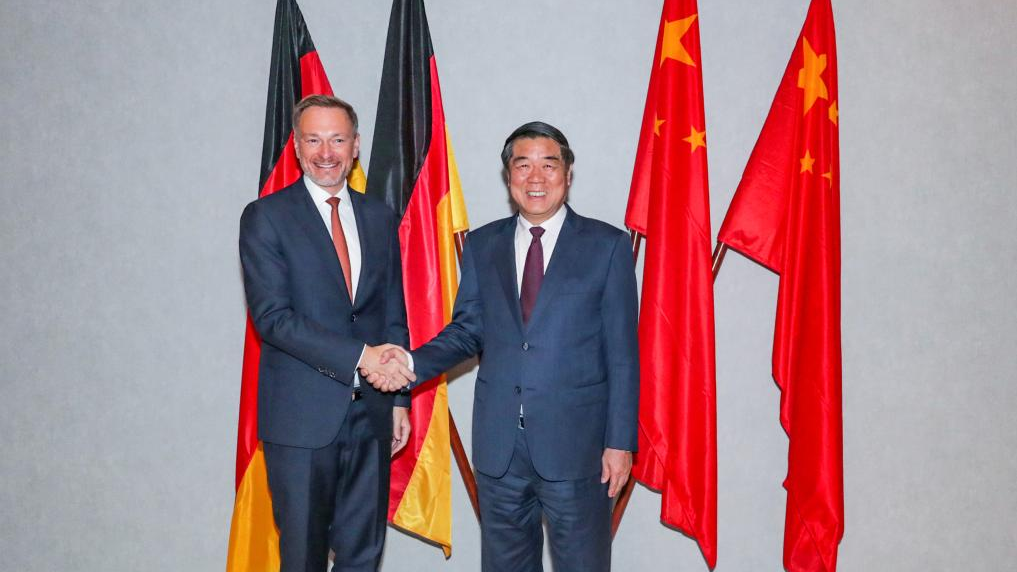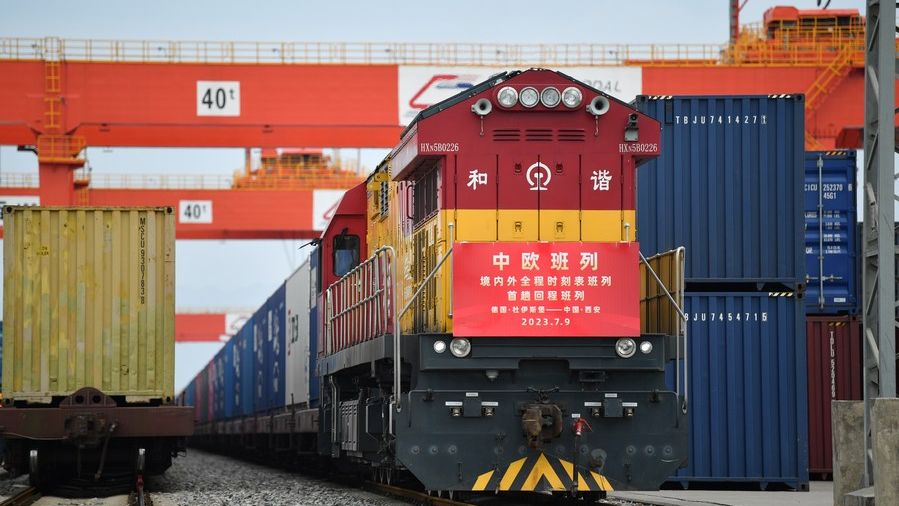By Liu Lirong

Chinese Vice Premier He Lifeng, also a member of the Political Bureau of the Communist Party of China Central Committee and the Chinese lead person of the third China-Germany high-level financial dialogue, shakes hands with Christian Lindner, the federal minister of finance and the German lead person of the dialogue, prior to the talks in Frankfurt, Germany, October 1, 2023. [Photo/Xinhua]
The third China-Germany high-level financial dialogue was held in Frankfurt, Germany on October 1, 2023. Chinese Vice Premier He Lifeng and German Finance Minister Christian Lindner co-chaired the dialogue. Affected by the COVID-19 pandemic, this dialogue mechanism has been suspended for four years. China and Germany issued a joint statement after the meeting, agreeing to strengthen cooperation in the financial field and expand two-way market opening based on fair competition. A total of 25 consensuses were reached during this dialogue, of which three highlights are particularly worthy of attention.
First of all, China and Germany are committed to ensuring the security of global supply chains. Affected by the U.S. policy toward China, the theory of "decoupling and breaking links" with China has become increasingly popular in the EU recently. This dialogue released a positive signal for expanding Sino-German cooperation. In the joint statement, China and Germany committed to promoting sustainable and inclusive growth of the world economy and ensuring the safety and smooth flow of the global supply chain.
Although there are many challenges in their bilateral relations, both China and Germany still have high expectations for the development of economic and trade relations. China and Germany are each other's indispensable and important trading partners, and the two sides are highly complementary in industry, supply chain and consumer market. As China's largest trading partner in the EU, the "decoupling and link breaking" theory has not had a substantial impact on German companies' investment and trade in China. According to the German Federal Statistical Office, China was Germany's most important trading partner in 2022 for the seventh time in a row.
At the ninth China-France High-level Economic and Financial Dialogue held at the end of July this year, French Minister of Economics and Finance Bruno Le Maire also made it clear that France does not want to "decouple" from China. The so-called "de-risking" is just a concept and does not mean that China poses a risk.
Secondly, China and Germany are committed to opposing trade protectionism. In the joint statement, China and Germany reaffirmed their commitment to an open world economy and multilateralism and to creating a fair and non-discriminatory market environment. China and Germany are both beneficiaries of global free trade. In an era of resurgence of trade protectionism, Sino-German cooperation is of great significance.

A China-Europe freight train departed from Duisburg of Germany arrives at Xi'an International Port in Xi'an, northwest China's Shaanxi Province, July 10, 2023. [Photo/Xinhua]
There are currently two new issues emerging in China-EU trade: First, the European Commission announced that it will launch a countervailing investigation into Chinese electric vehicles. The EU's move aims to protect Europe's traditional advantageous industries and curb strong competition from China. On this issue, there are divergent interests within the EU. China is an important market for the German automobile industry. If Europe adopts restrictive measures on Chinese electric vehicles, China will inevitably take countermeasures, and German automobile exports will also be affected. French and Italian automakers have a small share of the Chinese market and will be relatively less affected. Electric vehicles may become a new focus of China-EU trade disputes.
Second, the EU Battery and Waste Battery Regulations will be implemented in February 2024, which may form new barriers to China's lithium-ion battery exports. The EU is an important export market for China's lithium batteries. In the process of promoting renewable energy, Europe needs effective ways to store energy, and the demand for lithium-ion batteries will maintain strong growth in the future. Interdependence is the inevitable result of economic globalization. Ensuring supply chain security should be decided by enterprises themselves, rather than EU technocrats formulating binding trade protectionist policies.
The third highlight of this dialogue is that China and Germany are committed to deepening trade and investment cooperation. The joint statement pointed out that economic cooperation is beneficial to China and Germany, and strengthening bilateral economic relations will help achieve complementary advantages. Both He Lifeng and Lindner advocate increasing investment in each other's countries. Affected by Germany's policy adjustments towards China, Chinese companies' investment in infrastructure projects in Germany encountered setbacks in 2022. Correspondingly, German investment in China increased significantly in 2022 and continues to remain at a high level in the first half of 2023. Although the German Ministry of Foreign Affairs and Economic Affairs led by the Green Party has made high-profile calls to reduce dependence on China, German companies are still optimistic about the Chinese market. Germany and China both want to expand each other's market access and remove barriers to doing so.
Brexit provided an opportunity to enhance Frankfurt's position as a global financial center. The German side arranged for the finance dialogue to be held in Frankfurt instead of Berlin, with the purpose of strengthening Frankfurt's position as the European banking center and the "hub" for Chinese banks in the EU. During the dialogue, He Lifeng and Lindner also attended the Sino-German Financial Roundtable.
The China-Germany high-level financial dialogue mechanism is an important platform for China and Germany to carry out bilateral communication and policy coordination on strategic, overall and long-term issues in the financial field. It is worth noting that China and Germany have recently conducted many high-level exchanges of visits and dialogues: In April 2023, the sixth round of China-Germany Diplomacy and Security Strategic Dialogue was held in Beijing; in June 2023, Chinese Premier Li Qiang visited Germany and co-chaired with Germany Chancellor Olaf Scholz the seventh round of China-Germany government consultations; in September 2023, the fourth China-Germany high-level security dialogue was held in Berlin. In 2024, China and Germany will hold a Sino-German Financial Cooperation Dialogue Forum in Beijing to review the process and results of Sino-German financial cooperation over the past 40 years.
How to deal with the uncertainties brought about by great power competition and geopolitical games is the biggest challenge currently facing China-Germany relations. Dialogue and communication are conducive to enhancing political mutual trust and helping to resolve disagreements and conflicts.
The author is a special commentator on current affairs for CGTN.

 中文
中文



